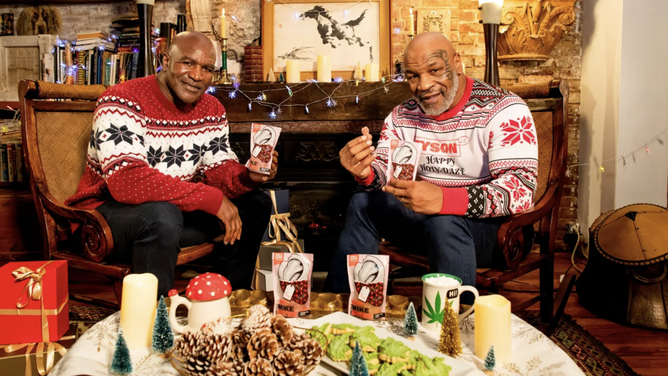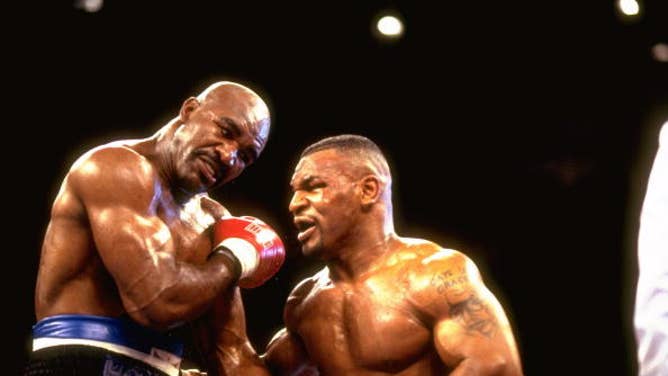Mike Tyson And Evander Holyfield Partner To Release 'Holy Ears' Cannabis Product
Mike Tyson and Evander Holyfield will be entering the ring as partners for their latest fight: Destigmatizing cannabis.
The boxing legends are using the infamous moment where Tyson bit a chunk of Holyfield’s ear off during their heavyweight title fight in 1997 to create "Holy Ears," THC and Delta-8 THC-infused edibles that are shaped like bitten ears, which will launch in November through "TYSON 2.0," the boxer’s cannabis company.
Tyson and Holyfield reunite under the newly formed Carma Holdings, which house TYSON 2.0 and Holyfield’s own cannabis line that will begin in 2023.

Evander Holyfield and Mike Tyson promoting "Holy Ears." (Photo c/o Tyson 2.0)
Tyson, who has been a cannabis advocate for some time, said it was his wife, Kiki’s, idea to have "Holy Ears" as a product.
"I said, ‘That’s awesome.’ Then, we played with it, we released it, it was an immediate success," Tyson, who initially dropped the product as "Mike Bites," told Fox News Digital. "It was immediate success, and so I was saying, ‘Why don’t Evander get involved too?’"
Tyson And Holyfield Fought Twice In The Late '90s
Holyfield was admittedly a bit skeptical about the partnership. It is not that it had anything to do with Tyson personally but, like many others when it comes to the cannabis space, Holyfield was not educated on the products until he went searching for some answers.
"They said it’s about helping people," Holyfield told Fox News Digital. "So I said, ‘I ain’t got no problem helping people.’ I didn’t know if it was something that I had to act like I was smoking reefer. I realized it is for helping somebody else. So the fact that something that helped somebody else, I was fine with that."
"We’re happy to have Evander in. We wanted him in since the beginning when we launched this. It’s been great," Chad Bronstein, Carma Holdings chairman and co-founder and president of TYSON 2.0, added.
Cannabis is a hot topic, especially since five states had proposals during the midterm elections to approve the legalization of recreational marijuana. Voters in Maryland and Missouri approved the legalization, while Arkansas, North Dakota and South Dakota rejected it.
"They just don’t get it yet. They don’t see it," Tyson said. "They don’t agree with this situation. It’s going to run right over them and everybody they love. It’s just too powerful. It’s God, it’s divine, it’s cannabis."
As he was educating himself, Holyfield saw that cannabis was helping Tyson.
"The point is anything helping somebody, why would someone want to step in the way when something is helping somebody else?" Holyfield questioned.

Evander Holyfield had part of his ear bit off by Mike Tyson. (Photo by John Iacono/Sports Illustrated via Getty Images) (SetNumber: X51698)
The Former Boxers Combined For 73 Career Knockouts
In sports, policies on marijuana usage has been relaxed to a degree, though it is still a banned substance on the United States Anti-Doping Agency list.
However, the NFL announced earlier this year they will be investigating the effects of cannabis on pain management and neuroprotection from concussions to their football players. MLB struck a deal with a CBD brand as the first U.S. sports league with an official cannabis partner. Additionally, the NBA extended its policy to no longer test players for cannabis, which has been the case since 2020 when the league shut down due to the pandemic.
While these are the biggest organizations in U.S. sports, there is more work to be done. It may not be tested as hard, but Tyson knows athletes are still wary to be as front-facing with cannabis use because of the general thought about it.
"It talks for itself. The athletes know it speaks for itself," Tyson said of his products. "They just don’t want to come out and hurt a contract or whatever they do because of the cannabis, and it’s not legal. But once it has that federal stamp of approval, what can I say? We can go anywhere. Sky is the limit."
Bronstein added, "I do believe we have a path to same thinking and federal legalization. When you look at what we’re doing, we’re destigmatizing it. You’re trying to destigmatize it. That’s what Mike’s been lending his voice to. I think it’s getting more and more accepted. And when COVID happened, it was really accepted when it was deemed an essential and that you can’t go anywhere except the grocery store and you can buy weed. So that was kind of a pretty big turning point for us."
'Holy Ears' Can Curb Anxiety
As a boxer, Holyfield mentioned the anxiety levels he would get to once he got in the ring during fights. He was not allowed to then, but if something like "Holy Ears" was available, he suggested it may have been something to help quiet the nerves.
"When it comes down to anxiety attacks, when I get in that ring, it’s kinda hard to breathe," Holyfield said. "But if there’s something that helps me, why would somebody say, ‘No, you can’t do that’ if it’s going to help you?
"I found that marijuana helps a lot of different things. …I don’t want to be a part of something that tears people down but helps them."
TYSON 2.0 is in 25 states as well as Canada. "Ric Flair Drip," WWE Hall of Famer Ric Flair’s cannabis company which Carma Holdings also has under its umbrella, is in 15 states right now. Eventually, Bronstein believes this can have an international reach.
"It’s about education," he said. " went out and did his due diligence. Ric Flair never smoked weed until he started Ric Flair Drip. He stopped taking Xanax and Ambien. He’ll tell you that straight up. So it’s education. It’s opening your mind and eyes to something and learning why it helps people and how it can help you."
Although no longer in the ring, Tyson knows that cannabis would have been a huge help for him back in his prime.
"If I was on cannabis, I would’ve never bit his ear!" Tyson said to Holyfield.
This article was contributed by Scott Thompson of Fox News Digital.